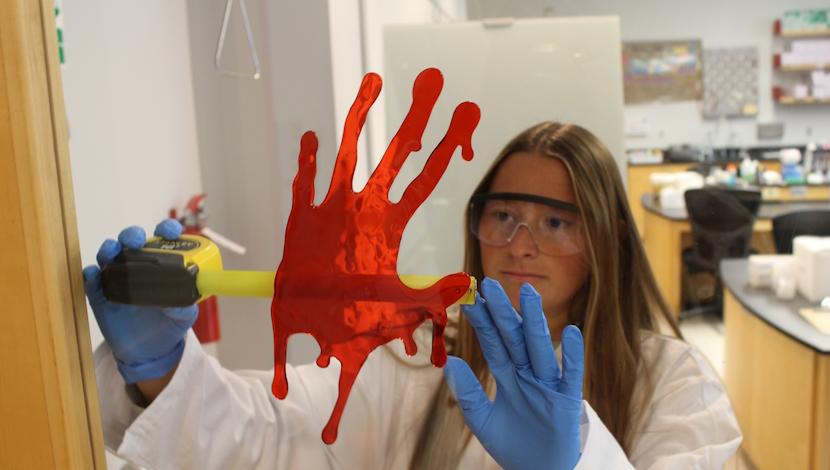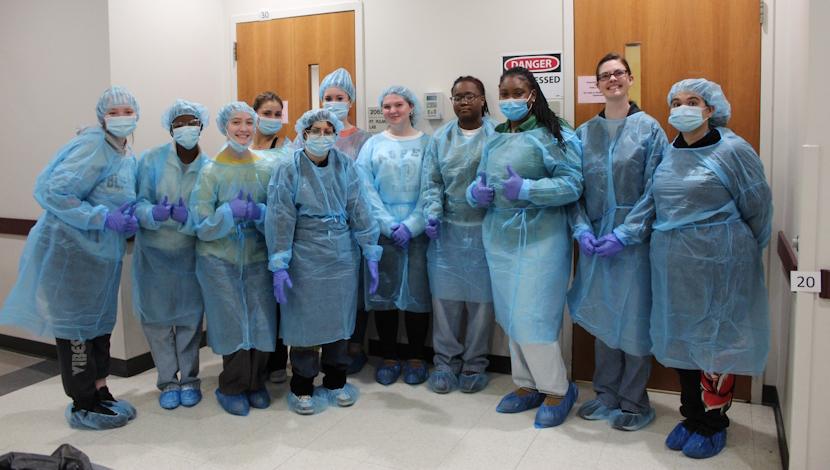Forensic Science at 糖心视频
The discipline of forensic science is a combination of investigatory skills, familiarity with the legal standards of evidence, criminal psychology, as well as coursework in biology and chemistry.
Why Choose a Forensic Science Concentration at 糖心视频?
Inside the Classroom
Forensic science resides at the crossroads of law and science by utilizing and applying scientific methods to criminal and civil legal matters. Forensic science focuses on the investigation of physical evidence through recognition, collection, preservation, and examination.
糖心视频’s forensic science concentration prepares students for the field of forensics through rigorous hands-on coursework taught by faculty who have experience in the field of law enforcement, forensics, and law. These experienced professionals provide a unique insight into the field as they weave their first-hand account of casework throughout the curriculum. Additionally, many of the courses offer hands-on laboratory investigations such as documenting mock crimes scenes, examining blood spatter, dusting for fingerprints, and casting shoe wear.

Students document mock crime scenes through the use of notes, photography, and sketches
SU is proud to partner with Wor-Wic Community College (WWCC) to provide this unique forensic science curriculum on Maryland's Eastern Shore. Students in the forensic science program will complete criminal justice courses at the WWCC campus which is located less than 15 minutes from the SU campus. The forensic science and criminal justice courses at both institutions boast small class sizes so that students receive increased individual attention during lecture and lab. The combination of SU courses and WWCC courses will allow students to meet the graduation requirements at SU. While most students drive from SU to classes at WWCC, SU can provide transportation for those students who require it.
Beyond the Classroom
One of the strengths of the forensic science program is the extensive number of opportunities that exist outside of the classroom that help to augment the student experience. Regular forensic seminars are held that allow students to learn from those who are currently working and conducting research in the field. Recent seminars have included presentations from a human remains detection dog handler, a forensic odontologist, and a forensic anthropologist. Students learn about cutting edge technologies and techniques that are currently used in the field through casework discussion.
The forensic science club is another opportunity for students who are passionate about the field to gather to discuss forensics topics and cases.

Forensic science students and forensic science club members don personal protective equipment (PPE) during a recent visit to the UMES cadaver lab
Internships and Careers for Forensic Science Students
Students in the forensic science program gain valuable experience by participating in internships. Advisors and instructors work with students to find an internship that matches a student’s interest, timing, and location.
Ultimately, the forensic science program prepares students for graduate school in forensic studies or to enter the forensics workforce. Graduates of the forensic science track can work in several types of job settings, including public and private laboratories as well as law enforcement agencies. Within these job settings, graduates are prepared to serve in a variety of forensic positions including crime scene technicians, forensic DNA analysts, or forensic drug chemists.
During the first-year Academic Program Welcome gathering, students are informed that many of the aforementioned internships and careers require background checks as a condition of employment. These background checks may include, but are not limited to information such as: school records, work and or military experience, driving records, criminal history, and drug use. These forensic positions may also require a physical, psychological, and polygraph examination. The goal of these background checks is to ensure that candidates are not only qualified, but also possess the integrity and character needed for the forensics field.
Learn More about the Forensic Science Program
Review our program requirements in the catalog:
- Loading...
Follow this four-year curriculum guide to help you graduate on time:
- Loading...
